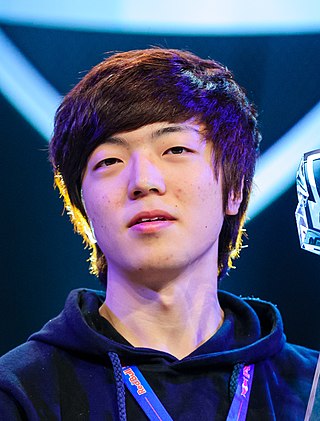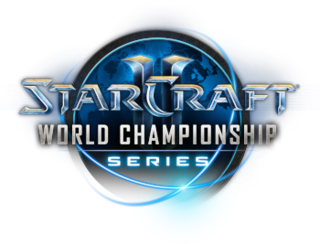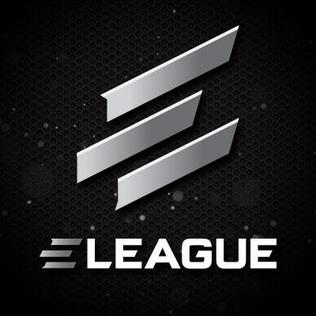A tournament is a competition involving at least three competitors, all participating in a sport or game. More specifically, the term may be used in either of two overlapping senses:
- One or more competitions held at a single venue and concentrated into a relatively short time interval.
- A competition involving a number of matches, each involving a subset of the competitors, with the overall tournament winner determined based on the combined results of these individual matches. These are common in those sports and games where each match must involve a small number of competitors: often precisely two, as in most team sports, racket sports and combat sports, many card games and board games, and many forms of competitive debating. Such tournaments allow large numbers to compete against each other in spite of the restriction on numbers in a single match.

OGN is a South Korean pay television channel that specialized in broadcasting video game-related content and esports matches, particularly StarCraft, Starcraft II, League of Legends, and Overwatch. OGN ran high level professional tournaments for 20 years; its premier competition included the Ongamenet Starleague (OSL), Proleague, League of Legends Champions Korea, and Overwatch APEX. It was previously a subsidiary of On-Media, the parent company of several other cable channels. After a corporate merger in 2010, it became a part of CJ ENM E&M Division. Most recently, League of Legends statistics website, OP.GG, which also sponsored LCK since 2022, has acquired OGN from CJ ENM following the shutdown of the linear TV network during the COVID-19 pandemic.
In the Australian Football League (AFL), previously the Victorian Football League (VFL), the pre-season competition, known during its history by a variety of sponsored names and most recently as the NAB Cup, was an annual Australian rules football tournament held amongst clubs prior to the premiership season between 1988 and 2013. The pre-season competition culminated annually in a grand final and pre-season premier.

Global StarCraft II League (GSL) is a StarCraft II: Legacy of the Void tournament hosted by afreecaTV and Blizzard Entertainment in South Korea. This event is broadcast up to 2 nights a week. GOMeXp had hosted it until the last season of 2015. There is also an English language stream available. The tournament features two leagues, Code S (major) and Code A (minor). The English cast of them is mainly performed by Dan "Artosis" Stemkoski and Nicolas "Tasteless" Plott. Formerly broadcast on Wednesdays and Saturdays on TwitchTV, the program switched to broadcasting on Mondays and Thursdays, with the English casts on YouTube, in 2020. In 2023, it was reported that the GSL will continue, but with a reduced presence: it will hold fewer, smaller tournaments with the preliminary matches played online, presumably due to Blizzard no longer funding the prize pools.
The 2012 StarCraft II World Championship Series (WCS) is part of the Battle.net World Championship Series, a series of video game tournaments held by Blizzard Entertainment, the creators of the video game StarCraft II (SC2). Tournaments were held in more than 28 countries to find top StarCraft II competitors. The top-ranked players from each continent were then invited to compete in the Global Finals in Shanghai, China. Korean player Won "PartinG" Lee-Sak emerged victorious in the final match against Jang "Creator" Hyun Woo, with third place going to Jung "Rain" Yoon Jong.

Lee Seung-Hyun, better known as Life, is a former professional South Korean StarCraft II player. He began his career in 2011 with Team Zenex, which merged with StarTale shortly after. He later played for KT Rolster and shortly for Afreeca Freecs. At the end of his career, Life was one of the most accomplished StarCraft II players of all time with second most premier tournament wins of any StarCraft II player, including one World Championship Series title in 2014, two Global StarCraft II League (GSL) titles, one GSL Blizzard Cup title, two Major League Gaming titles, two DreamHack titles, and one Intel Extreme Masters title.

The StarCraft II World Championship Series (WCS) was a StarCraft II professional tournament series organized and sanctioned by Blizzard Entertainment that ran from 2012 to 2019. For all but its first year of operation, it was the highest tier of professional StarCraft II competition. Its longest-running iteration featured two regions, World Championship Series Korea and World Championship Series Circuit, with World Championship Series Global events featuring players from both regions. Grand finals were held annually at BlizzCon in Anaheim, California, except for the first year of competition, when the finals were held in Shanghai, China. WCS Circuit events were streamed on Twitch while WCS Korea events were available on Twitch, YouTube, and afreecaTV.
StarCraft II Proleague, also known as StarCraft Proleague or Proleague for short, was the longest running StarCraft league in the world and the most prestigious team league. Hosted by the Korean eSports Association (KeSPA), the league was played offline in South Korea. Proleague began in 2003 with the game StarCraft: Brood War before switching over to StarCraft II in 2011 and then discontinued in 2016. It was broadcast by SPOTVGames prior to being discontinued.

MLG Counter-Strike: Global Offensive Major Championship: Columbus, also referred to as MLG Columbus 2016 was the eighth Counter-Strike: Global Offensive (CS:GO) Major Championship held by Major League Gaming (MLG) throughout March 29 to April 3, 2016, in the Nationwide Arena in Columbus, Ohio, United States. It was the first CS:GO Major in North America as well as the first run by Major League Gaming, who previously ran an exhibition CS:GO tournament at X Games Aspen 2015. It was also the very first CS:GO major in which ESL or DreamHack was not the organizer. It was announced on February 23, 2016, that MLG Columbus 2016 would be the first Counter-Strike tournament with a $1,000,000 prize pool.

ELeague, shortened as EL, and stylized as ΞLEAGUE is an esports league and American television show that airs on TBS. It was announced in September 2015 as a partnership between Turner Broadcasting and talent agency WME/IMG. The name "ELeague" was officially unveiled later that year.
Professional StarCraft II competition features professional gamers competing in Blizzard Entertainment's real-time strategy game StarCraft II. Professional play began following the game's initial release in 2010, as the game was the long-awaited sequel to StarCraft, considered one of the first esports and the foundation of South Korea's interest and success in competitive gaming. Between 2016 and 2019, competition was centered around the Global StarCraft II League in Korea and the World Championship Series Circuit everywhere else, with all Blizzard-sanctioned events being under the StarCraft II World Championship Series (WCS) banner. Since 2020, Blizzard changed the format of WCS by entering into a three-year partnership with esports organizers ESL and DreamHack.

Joona Sotala, better known as Serral, is a Finnish professional StarCraft II player using the race Zerg. In 2018, Serral became the first non-Korean player to win the StarCraft II World Championship Series (WCS). He won every major non-Korean tournament in 2018, the 2018 Global Starcraft II League (GSL) vs. the World event and, ultimately, the 2018 WCS Global Finals. In 2022, he won the Intel Extreme Masters Katowice, and with the updated championship format he won the world championship of StarCraft II for the second time.
The 2018 StarCraft II World Championship Series (WCS) is the 2018 edition of the StarCraft II World Championship Series, the top esports tournament circuit for StarCraft II. Featuring the top eight players from each WCS region, World Championship Series Korea and the World Championship Series Circuit, the Global Finals received greater coverage than most prior events when Finnish professional player Joona "Serral" Sotala became the first non-Korean world champion in the StarCraft series.
The 2017 StarCraft II World Championship Series (WCS) is the 2017 edition of the StarCraft II World Championship Series, the highest level of esports competition for StarCraft II. The tournament series' Global Finals were won by South Korean professional player Lee "Rogue" Byung Ryul.
The 2016 StarCraft II World Championship Series (WCS) is the 2016 edition of the StarCraft II World Championship Series, the highest level of esports competition for StarCraft II. The tournament series' Global Finals were won by South Korean professional player Byun "ByuN" Hyun Woo.
The 2015 StarCraft II World Championship Series (WCS) is the 2015 edition of the StarCraft II World Championship Series, the highest level of esports competition for StarCraft II. The tournament series' Global Finals were won by South Korean professional player Kim "sOs" Yoo Jin, becoming the first two-time StarCraft II world champion.
The 2014 StarCraft II World Championship Series (WCS) is the 2014 edition of the StarCraft II World Championship Series, the highest level of esports competition for StarCraft II. The tournament series' Global Finals were won by South Korean professional player Lee "Life" Seung Hyun.
The 2013 StarCraft II World Championship Series (WCS) is the 2013 edition of the StarCraft II World Championship Series, the highest level of esports competition for StarCraft II. The tournament series' Global Finals were won by South Korean professional player Kim "sOs" Yoo Jin.
The 2019 StarCraft II World Championship Series (WCS) is the 2019 edition of the StarCraft II World Championship Series, the top esports tournament circuit for StarCraft II. The tournament series' Global Finals were won by South Korean professional player Park "Dark" Ryung Woo.







